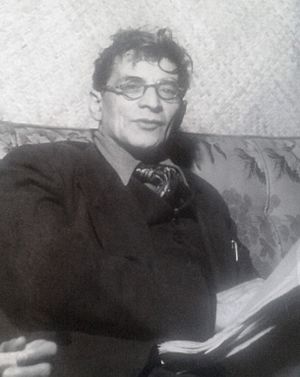Jean Wahl facts for kids
Quick facts for kids
Jean André Wahl
|
|
|---|---|
 |
|
| Born | 25 May 1888 Marseille, France
|
| Died | 19 June 1974 (aged 86) Paris, France
|
| Alma mater | École Normale Supérieure |
| Era | 20th-century philosophy |
| Region | Western philosophy |
| School | Continental philosophy Existentialism |
|
Main interests
|
History of philosophy |
|
Influenced
|
|
Jean André Wahl (French: [val]; 25 May 1888 – 19 June 1974) was an important French philosopher. He was known for introducing new ideas and for his unique way of thinking.
Contents
Early Life and Studies
Jean Wahl studied at the École Normale Supérieure, a famous school in France. After his studies, he became a professor at the Sorbonne, another well-known university. He taught there from 1936 to 1967.
During World War II, his teaching was interrupted. Because he was Jewish, he was held in a camp called Drancy internment camp near Paris. Luckily, he managed to escape and went to the U.S. in 1942, where he stayed until 1945.
His Philosophical Ideas
Jean Wahl started his career by following the ideas of other philosophers. These included Henri Bergson from France and American thinkers like William James and George Santayana.
He is especially known for bringing the ideas of G. W. F. Hegel to France in the 1930s. Hegel was a very important German philosopher. Wahl also helped make the ideas of Søren Kierkegaard popular in France. Kierkegaard was a Danish thinker who is seen as an early existentialist. Existentialism is a philosophy that focuses on human existence and freedom.
Wahl wrote important books about these ideas, such as Le malheur de la conscience dans la Philosophie de Hegel (1929) and Études kierkegaardiennes (1938). His work influenced many famous thinkers, including Gilles Deleuze, Emmanuel Levinas, and Jean-Paul Sartre. Jean Wahl was known for being a philosopher who liked new ideas and real-world experiences, rather than sticking to strict systems.
Time in the United States
While in the U.S. during World War II, Jean Wahl helped create a special "university in exile." It was called the École Libre des Hautes Études and was set up in New York City.
Later, at Mount Holyoke College, he started meetings called Décades de Mount Holyoke. These were like famous French discussion groups from earlier times. They brought together French thinkers who were in exile during the war. Americans, including poets like Marianne Moore and Wallace Stevens, also joined these discussions. Wahl, who was also a poet, even translated some of Stevens' poems into French.
After World War II
After the war, Jean Wahl returned to France and became a very important figure. He was a respected teacher and helped edit academic journals.
In 1946, he founded the Collège philosophique. This was an important place for thinkers who wanted to explore new ideas outside of the traditional university system. From 1950, he also led the Revue de Métaphysique et de Morale, a well-known philosophy journal.
Wahl also translated a part of Plato's Parmenides, an ancient Greek text. His translation was used by Jacques Lacan, a famous psychoanalyst, in his work.
Jean Wahl in Books
In 2021, a book called Outside the Gates was published. It is a story based on Jean Wahl's real experience of being released from the Drancy Internment Camp. The story is told from Wahl's point of view. He shares his experiences and thoughts about life, suffering during the war, and questions about God.
Major Works
Jean Wahl wrote many books on philosophy. Here are some of his important works:
- Du rôle de l'idée de l'instant dans la Philosophie de Descartes (1920)
- Les Philosophies pluralistes d'Angleterre et d'Amérique (1920)
- Le Malheur de la conscience dans la Philosophie de Hegel (1929)
- Étude sur le Parménide de Platon (1930)
- Études kierkegaardiennes (1938)
- Petite histoire de l'existentialisme (1947)
- Traité de Métaphysique (1953)
- L'Expérience métaphysique (1964)
English Translations of His Works
Some of Jean Wahl's books have been translated into English, making his ideas available to more readers:
- The Philosophers Way (1948)
- The Pluralist Philosophies Of England And America (1925)
- A Short History of Existentialism (1949)
- Transcendence and the Concrete: Selected Writings of Jean Wahl. (2016)
- Human Existence and Transcendence. (2016)
See also
 In Spanish: Jean Wahl para niños
In Spanish: Jean Wahl para niños
 | James Van Der Zee |
 | Alma Thomas |
 | Ellis Wilson |
 | Margaret Taylor-Burroughs |

